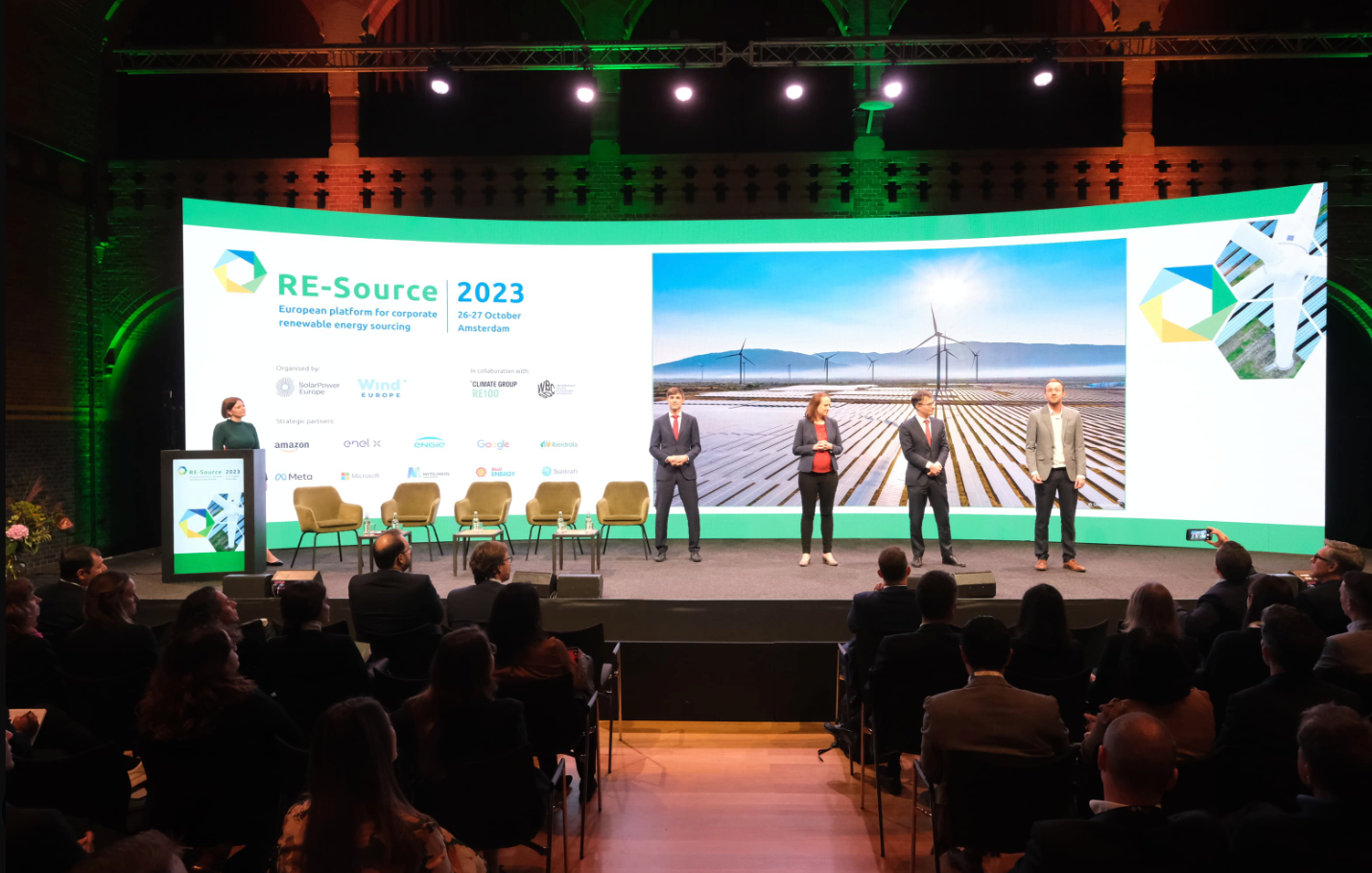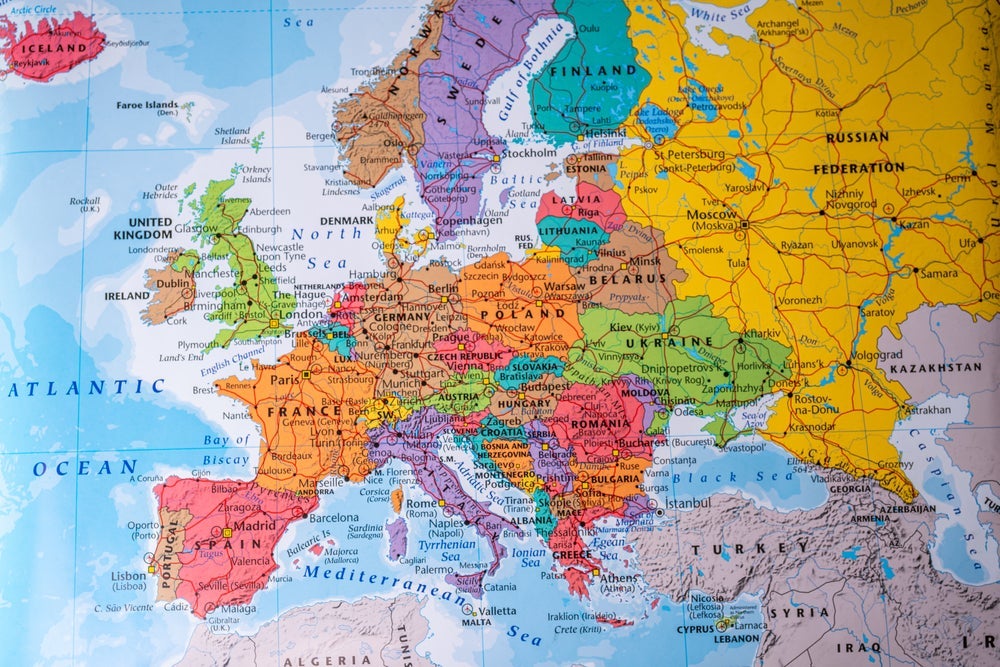
AMSTERDAM – Multi-buyer PPAs are allowing more companies from diverse sectors to enter the corporate renewable power purchase agreement (PPA) market, industry leaders told delegates gathered at the RE-Source 2023 conference.
The conference saw 1,300 corporate renewable PPA energy buyers and sellers from across Europe meet in Amsterdam on 26 and 27 October to broker new deals and hear about the latest developments in the booming sector.
The conference occurred as the latest data showed that companies across more and more sectors are entering the corporate renewable PPA market, with 11 sectors now having more than 500MW of cumulative contracted PPA capacity across Europe.
Multi-buyer PPAs are a key tool that can allow smaller companies in a wide range of sectors to get involved in corporate renewable energy power purchasing, said speakers convened for an expert panel at RE-Source 2023.
“We certainly have seen a huge amount of interest in [multi-buyer PPAs]”, said Ally Charlton, director of Renewable Energy & Carbon Advisory at Schneider Electric. “It is coming from bigger companies that have addressed scope 1 and 2 emissions, and want to now focus on scope 3.
“It is also coming from the smaller companies that can’t necessarily access [PPA] solutions on their own. By doing it in an aggregated way they can actually access them”.
How well do you really know your competitors?
Access the most comprehensive Company Profiles on the market, powered by GlobalData. Save hours of research. Gain competitive edge.

Thank you!
Your download email will arrive shortly
Not ready to buy yet? Download a free sample
We are confident about the unique quality of our Company Profiles. However, we want you to make the most beneficial decision for your business, so we offer a free sample that you can download by submitting the below form
By GlobalDataCharlton’s team has assisted a programme by US supermarket giant Walmart to decarbonise its “entire supply chain”, she said. PPA deals for this programme have already been completed in the US.
“Building on that experience, we then moved into the Energize programme, which is a collaboration with the pharmaceutical industry that now has 19 sponsor companies,” added Charlton. “Some 450 suppliers – and counting – of those pharmaceutical companies are now part of the Energize programme”.
Other projects Charlton and her team are working on include a project from PepsiCo to decarbonise its whole supply chain, as well as a programme to purchase renewable energy for the semiconductor industry. “Suffice to say, there is huge interest in this, and there is an awful lot under way that I can’t talk about at this time”, she said. “It is keeping us very busy.”
The panel at RE-source 2023 also heard from Kristen Nuttall, head of programs at the Fashion Pact, a fashion industry-wide movement to build a “nature positive and net zero future for fashion”. It includes everyone from adidas and Inditex (the owner of Zara, Bershka and Pull&Bear) to Burberry and the Armani Group.
As part of its mission, the Fashion Pact encourages its members to achieve 100% renewable energy usage across their own operations by 2030. It has accordingly collaborated with renewables giant Lightsource BP to devise a multi-party PPA structure that suits its members.
“We have looked at what we can do collectively to suit our members, whether they are luxury, high street, retailers or suppliers”, said Nuttall. “We hope that our model can be an example for other companies in other industries to follow suit."
Greg Simmons, director of energy sustainability and infrastructure at management consultancy Guidehouse, led on technical and economic advisory for the Fashion Pact in its purchase of renewable energy.
“Energy can be a complex task, and is not always top-of-mind for all of our organisational partners,” said Simmons. “One of our key aims from the beginning was to create a structure that works for both very large organisations with significant volumes that have established credit profiles, but also creating opportunities for smaller organisations with less consumption and less established credit capacity who have benefitted from the collective action.”
The Fashion Pact was able to design a scheme for its diverse members by establishing a very clear memorandum of understanding (MoU) from members from the outset of negotiations, said Simmons.
“Through a series of workshops, the brands agreed on a number of factors including pricing structure, economic outcomes, additionality requirements, an acceptable location of the asset, and the community and ethical values that they desired to achieve”, said Simmons. “The outcomes of these conversations were codified in an MoU, which became our guiding document”.
Based on the MoU, the Fashion Pact received interest from 16 renewable energy suppliers, which were shortlisted, until Lightsource BP was selected to develop new solar capacity in Spain.
There were, however, also warnings issued at RE-Source 2023 that while multi-buyer PPAs are certainly a useful tool, they are complicated to negotiate and by no means a one-size-fits-all solution.
“Negotiations are hard, and there is lots of tension between buyers and sellers, all of whom have lots of different desired outcomes”, warned Simmons.
The buyer, for example, tends to want a short-term contract with a fixed price, while developers aim for very long-term agreements that have a variable pricing outcome that can be challenging. “The tensions that exist here become even more complicated when negotiating a multi-buyer PPA,” says Simmons.
Schneider Electric’s Charlton added: “”There is so much buzz about them, but multi-buyer PPAs are certainly not for everyone.
“There are advantages in having a diversity of buyers, but the developers also know it is going to be a more complex process.
“Our job is to streamline the process and make it as easy as possible for everyone,” she added, “but it is important if you are thinking about getting into this to know why you want to do it, and to have already committed resources to making it happen”.







